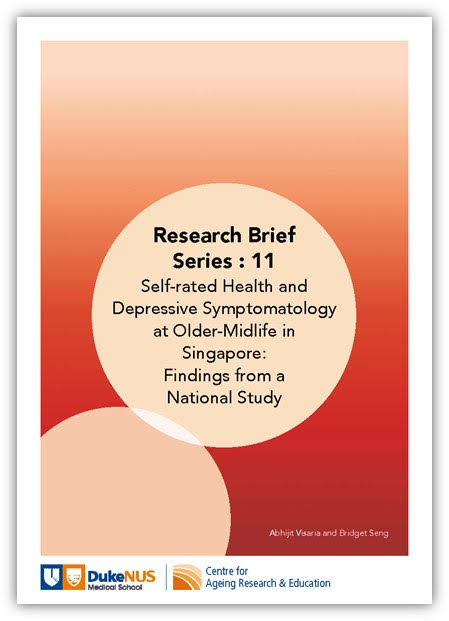Self-rated health, depressive symptomatology at older-midlife in Singapore
CARE releases its latest research brief shedding light on the health and well-being of this group.
 While there has been considerable research on older adults aged 60 years and above in Singapore, there are few sources of data and studies on the health of older-midlife Singaporeans. The age-group of 50 to 59 years constituted about 10 percent of the resident population of Singapore in 2010, and has increased to nearly 15 percent in 2020. In terms of an overall or general health measure, a number of previous studies have found that self-rated health (SRH) is an accurate indicator of current health and predictor of future health.
While there has been considerable research on older adults aged 60 years and above in Singapore, there are few sources of data and studies on the health of older-midlife Singaporeans. The age-group of 50 to 59 years constituted about 10 percent of the resident population of Singapore in 2010, and has increased to nearly 15 percent in 2020. In terms of an overall or general health measure, a number of previous studies have found that self-rated health (SRH) is an accurate indicator of current health and predictor of future health.
Over the next decade, individuals at these ages will transition to older ages, and their trajectories as they age will be influenced to a large extent by their health and well-being at older-midlife. The Centre for Ageing Research and Education (CARE) has released its latest research brief called “Self-rated Health and Depressive Symptomatology at Older Midlife in Singapore: Findings from a National Study”, where they shed light on the health and well-being of older-midlife Singaporeans by studying their general health in terms of SRH, and mental health or well-being measured in terms of depressive symptoms.
Data for this analysis came from the Panel on Ageing and Transitions in Health Survey (PATHS), a survey of 1,654 older-midlife Singapore citizens and permanent residents aged 50 to 59 years, that was conducted in 2016 to 2017 by CARE.
Here are some of the key findings:
- Overall, among older-midlife adults, about 71 percent reported being in good, very good, or excellent health. About 29 percent reported that they were in fair or poor health. About one in four older-midlife adults in the study had clinically-relevant depressive symptoms.
- Females compared to males were more likely to report being in fair or poor health compared to good health. Females were less likely to have clinically-relevant depressive symptoms compared to males.
- Malays were more likely than the Chinese to report being in good health compared to either fair/poor or excellent/very good health. They were more likely than the Chinese to have clinically-relevant depressive symptoms.
- Perceived income inadequacy was associated with worse self-rated health and with a greater likelihood of clinically-relevant depressive symptoms.
• Formal volunteering was associated with excellent or very good self-rated health, indicating that there are health benefits from volunteering at older-midlife in Singapore.
** To download a copy of the brief, go to: www.duke-nus.edu.sg/care/publications/policy-briefs. There are also other research briefs related to seniors that you can download, including the triumphs and tribulations of older workers, pursuit of learning among older Singaporeans, older adults and home alone and predictors of falls.

0 Comments